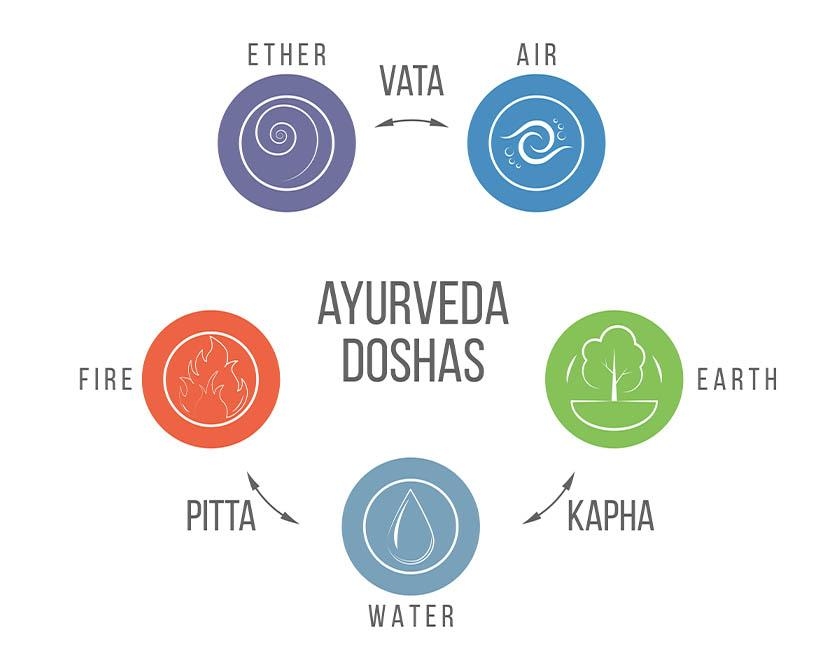Ayurveda
Ayurveda is one of the ancient systems of medicine originating from India that focuses on the concept of ‘equilibrium’ of the body through diet, herbal remedies, and life habits.

Ayurveda is an ancient Indian healing system that promotes a complete approach to health, incorporating the body, mind, and spirit. According to Ayurveda, the best way to improve well-being and achieve liveliness involves adapting daily routines to natural rhythms as well as individual constitutions. This implies that one can greatly benefit one’s health and live harmoniously by integrating such principles of Ayurveda into everyday life, which are related to feeding on a diet and exercise, among others.
What is the core philosophy of Ayurveda in daily living?
Ayurveda emphasizes balance among body, mind, and spirit for health and well-being. It promotes natural remedies, balanced nutrition, and daily routines (Dinacharya) aligned with nature’s rhythms. Understanding your dosha (body type) guides personalized lifestyle choices. Embrace self-awareness and mindfulness to foster holistic wellness.
Ayurveda is the ancient Indian system of healing that envisions good health by keeping the body, mind, and spirit in perfect balance. The approach highlighted here is on natural remedies, proper nourishment, and lifestyle practices that work in rhythm with nature. One can achieve perfect health by simply knowing his or her dosha—Vata, Pitta, or Kapha—and living accordingly. This integrates mindfulness, self-awareness, and personalized care toward overall wellness. Daily practices such as meditation, yoga, and mindful eating can be adopted to maintain good health. By living according to these principles, Ayurveda seeks to foster health and spiritual growth toward a more balanced life.
How can Ayurveda improve your daily routine?
Ayurveda recommends a structured daily routine to align with natural cycles. Morning rituals include meditation, oil pulling, and yoga. Regular meals with fresh, seasonal foods balance doshas. Adequate sleep and relaxation support mental and physical health. Consistency fosters harmony and enhances overall wellness.
Bring yourself into balance and harmony with the adoption of an Ayurvedic daily routine, or dinacharya. Begin each day with oil pulling, tongue scraping, and meditation to purify and center the mind and body. Add in some yoga and breathing exercises to bring energy and strength to the body. During different seasons, eat fresh seasonal foods in accordance with your dosha at regular intervals to help maintain good digestion and thus promote energy. Take sufficient rest; not only have enough sleep but also indulge in relaxing, which is essential for the health of your mind. The above well-planned routine based on the cycles of nature will initiate regularity, generally improving the well-being and vitality of a person.

What are the benefits of an Ayurvedic diet?
An Ayurvedic diet is tailored to individual doshas, promoting digestion, energy, and immunity. It emphasizes fresh, whole foods with herbs and spices for flavor and healing properties. Avoid processed foods to enhance vitality and prevent disease. This personalized approach fosters long-term health and balance.
An Ayurvedic diet is founded on the principle of health promotion by the intake of food that works best for each dosha through proper digestion to derive energy and strengthen immunity. Ayurveda will work in conjunction with your body, using fresh, whole foods and health-enhancing herbs and spices like turmeric, cumin, and ginger. It’s a way of avoiding the processing and refining of food elements to prevent diseases and improve vitality. It brings about balance and longevity through mindful eating and seasonal adjustments, taking care of the unique nutritional needs of a person and letting him or her relate food to his or her body and overall well-being.
How does Ayurveda support mental health?
Ayurveda nurtures mental health through mindfulness, meditation, and balanced lifestyle choices. It suggests herbal supplements like Ashwagandha and Brahmi for calming effects. Self-care practices, such as Abhyanga (oil massage), relieve stress and anxiety. Emphasizing self-awareness and inner peace, Ayurveda promotes emotional well-being.
Ayurveda treats mental health by engaging in mindfulness practice, meditation, and balanced lifestyle choices aimed at nourishing emotional well-being. Herbal dietary supplements include Ashwagandha and Brahmi, which are recommended for their potent actions in quieting the mental faculties and reducing stress levels to bring mental clarity and strength. It also gives prescriptions for self-care practices such as Abhyanga, or oil massage, for its stress-relieving and sleep-enhancing properties. While heavily emphasizing the development of self-awareness, regulation of emotions, and inner peace, Ayurveda treats mental health in an integrated manner and works toward laying a firm platform for emotional stability and overall well-being. These practices bring a person into harmony with his or her inner self.
What are Ayurvedic remedies for stress management?
Ayurveda offers stress-relieving techniques like meditation, Pranayama (breathing exercises), and herbal teas. Adaptogenic herbs like Ashwagandha and Tulsi support resilience. Daily routines, grounding practices, and mindfulness foster calmness and reduce anxiety. These holistic strategies restore balance and promote relaxation.
Ayurveda has devised strong remedial measures against stress through holistic techniques of meditation and pranayama, which bring a quiet mind and, hence, the inner strength to fight against the odds of stress. Herbal teas prepared with adaptogenic herbs like Ashwagandha and Tulsi provide a natural way to relieve stress and help the body adapt to stressors. Ayurveda supports daily routines and grounding practices, including mindful walking and yoga, in order to create relaxation in the body that could reduce anxiety within a person. Such techniques bring back balance, clear the mind of confusion, and bring calm and serenity.

How does Ayurveda approach disease prevention?
Ayurveda focuses on disease prevention by maintaining balance through diet, lifestyle, and mindfulness. It encourages detoxification, strengthening digestion, and boosting immunity. Personalized health strategies align with dosha types, promoting overall well-being and resilience against illnesses. Prevention is achieved by addressing root causes.
Ayurveda prevents diseases by balancing diet, life routine, and mindfulness. Focusing on person-tailored health strategies in relation to individual doshas, Ayurveda strengthens the body’s natural defenses against illness. It advocates detoxification at frequent intervals for the removal of toxins and thus promotes digestion and improves immunity. Focusing on the root causes, Ayurveda looks forward to preventing diseases rather than merely treating their symptoms. Ayurveda’s methodologies, which include yoga, meditation, and proper diet, build whole health and resilience and thus lay the ground for a holistic system that assures long-term health and discourages the incidence of chronic diseases.
Conclusion
In this talk we have looked at some basics behind ayurveda – emphasizing its holistic nature when it comes to healthcare provision. Starting small like morning rituals or even just meal prep may help get you into becoming more ayurvedic in life which will definitely change everything about yourself!
References
Ayurveda
Ayurveda is one of the ancient systems of medicine originating from India that focuses on the concept of ‘equilibrium’ of the body through diet, herbal remedies, and life habits.

Feeling confused by alternative medicine? Don’t worry, you’re not alone. As people become more interested in natural health, terms like naturopathy and Ayurveda are popping up all over the place. But what do they mean, and how can you tell which one is right for you? Let’s take a closer look at these holistic systems and discover their main points of difference to help guide your wellness journey.
What is the focus of naturopathy compared to Ayurveda?
Naturopathy emphasizes holistic healing through natural remedies and lifestyle changes, focusing on diet, exercise, and stress management. Ayurveda, an ancient Indian practice, prioritizes balancing the body’s energies, or doshas, using herbal treatments, dietary guidelines, and meditation. Both aim for wellness but with distinct methodologies.
Naturopathy thus goes to the very root of illness. Its emphasis is on prevention and self-healing through the body. Modern scientific methods go with the traditional concepts of healing in naturopathy.
Ayurveda, however, goes to the roots of ancient texts and traditions, stressing balance on three basic energies: Vata, Pitta, and Kapha. These have to be in equilibrium for one’s healthy state. While both disciplines are engrossed in preserving health and long life, Ayurveda adds spiritual and philosophic elements to treatment and lifestyle recommendations.
How do naturopathy and Ayurveda differ in treatment methods?
Naturopathy uses diet, exercise, and natural therapies like hydrotherapy and homeopathy. Ayurveda focuses on balancing doshas through herbal medicines, dietary changes, yoga, and meditation. While both use natural remedies, Ayurveda emphasizes ancient practices and personalized treatments based on an individual’s unique body constitution.
Naturopathy is often found resorting to modern diagnostic tools and scientific research to help design treatment plans by dwelling on the very lifestyle habits and environmental factors which have wreaked havoc on health. This can include physical therapies, detoxification, and counseling.
Ayurveda applies a more personalized approach, where certain herbs and dietary adjustments, together with yoga practices, are recommended according to one’s dosha, or constitution. Most Ayurvedic treatments involve the process of Panchakarma, which is a detoxification process that tries to cleanse the body of impurities.
While both systems work on holistic and natural methods, Ayurveda puts a greater emphasis on ancient techniques and knowledge handed down through the ages.

What are the origins of naturopathy and Ayurveda?
Naturopathy originated in 19th-century Europe and North America, drawing from traditional natural healing practices. Ayurveda, over 5,000 years old, originated in India and is one of the world’s oldest holistic healing systems. Both emphasize natural wellness but stem from different cultural and historical backgrounds.
Naturopathy was initially introduced as a definite system of health care in the 19th century but represents the amalgamation of different ancient healing practices in Europe. It leans toward the healing capacity of nature and the therapeutic use of nature.
On the other hand, Ayurveda is based on ancient Indian texts like the Vedas and has much influenced traditional East healing customs. Its principles, which balance the body, mind, and spirit by diet, lifestyle, and natural therapies, were indeed practiced many thousand years ago. Both systems suggest holistic health with natural methods despite their completely different origins.
How do practitioners diagnose patients in naturopathy versus Ayurveda?
Naturopathy uses modern diagnostic tools, including blood tests and imaging, alongside lifestyle assessments. Ayurveda diagnoses through pulse reading, tongue examination, and understanding doshas. Ayurvedic practitioners focus on energy balance and lifestyle factors, while naturopaths emphasize scientific analysis combined with holistic assessments.
In naturopathy, there are comprehensive evaluations; diet, lifestyle, and environment were looked upon against the backdrop of traditional diagnostic tests. They can also make use of some non-invasive assessment tools that include iridology and kinesiology.
Ayurveda, on the other hand, borrows from traditional or ancient diagnostic measures, of which Nadi Pariksha is one conducting pulse diagnosis to assess imbalances in doshas and Prakriti, the constitution of a person. Practitioners use physical signs such as skin texture, body shape, emotional trends, and others to identify imbalances.
This holistic approach assists in tailoring treatment plans at an individual level. While naturopathy bends more toward scientific analysis, Ayurveda lays emphasis on traditional energy-based assessment techniques.

Are naturopathy and Ayurveda regulated differently?
Naturopathy is often subject to regulation and licensure in many countries, with practitioners requiring formal education. Ayurveda may not be as strictly regulated outside India, where it’s integrated into the healthcare system. Regulations for both vary globally, influencing practice standards and accessibility.
For instance, in the United States, naturopathy is a profession that requires an accredited program and passage of a licensing exam to legally practice. Regulations provide some assurance that practitioners have a minimum level of educational and professional competence. Ayurveda has gained institutional recognition in India and has even been integrated into the general healthcare infrastructure.
However, it does not have the same uniform regulatory standards on a worldwide scale. In other countries, there may not be any formal licensing requirements for Ayurvedic practitioners, though some certification programs are available to guarantee a certain level of training quality. Its lack of standard regulation outside India compares to the way in which Ayurveda is both practiced and perceived internationally in contrast to naturopathy.
What role does diet play in naturopathy and Ayurveda?
In naturopathy, diet is crucial for detoxification and healing, emphasizing whole foods and nutrients. Ayurveda tailors diets to individual doshas, promoting balance through specific foods and eating habits. Both systems consider diet a foundation for health but apply it differently based on philosophical principles.
Naturopathy emphasizes whole, unprocessed foods and espouses good nutrition to support the body in its efforts toward self-healing and prevention of disease. It may embrace detox diets or specific nutrition plans to meet individual health needs. Ayurveda believes diet is one of the most important parts of treatment and will prescribe a diet including foods consistent with a person’s dosha.
Dietary recommendations in Ayurveda are tailored to restore balance and achieve harmony within the body relative to seasonal variations and individual constitutions. In fact, these traditional medicine systems approach food as medicine; however, due to their base philosophy, their emphasis differs with regard to their perceptions.
How do naturopathy and Ayurveda view the mind-body connection?
Both naturopathy and Ayurveda recognize the mind-body connection but approach it differently. Naturopathy integrates stress management and mental wellness with physical health through lifestyle changes. Ayurveda uses practices like yoga and meditation to harmonize mind and body, focusing on energy balance and spiritual growth.
Naturopathy includes but is not limited to, stress reduction techniques, such as mindfulness, meditation, and lifestyle counseling for general improvement in well-being. It views mental and emotional health as inseparable from physical health. Ayurveda, rooted in spiritual and philosophical traditions, places strong emphasis on the relation of body, mind, and spirit.
It therefore means that practices like yoga and meditation become inseparable in the attainment of balance and enlightenment by addressing spiritual dimensions of health. Both systems bring the mind and body into harmony but place different emphases on their mental and spiritual approaches to health.
Wrapping Up!
Naturopathy and Ayurveda have different but effective ways of achieving holistic wellness. By knowing their basic ideas and main distinctions, you are able to select a route that resonates with you most. Keep in mind, though, that there is no one-size-fits-all cure for getting better from illness. It’s all about listening to yourself so don’t be afraid to try out new things until everything falls perfectly into place with your physical, mental wellbeing as well as spiritual growth.
Ayurveda
Ayurveda is one of the ancient systems of medicine originating from India that focuses on the concept of ‘equilibrium’ of the body through diet, herbal remedies, and life habits.

Ayurveda is a form of ancient Indian medicine. It has existed for over 500 years and focuses on balancing the mind, body and spirit to gain optimum health.
What is the basic concept of Ayurveda?
The basic concept of Ayurveda is the balance of mind, body, and spirit through natural methods. It emphasizes individualized treatment, focusing on diet, lifestyle, and herbal remedies to maintain harmony among the body’s three doshas: Vata, Pitta, and Kapha.
The fundamental concept behind this Indian practice is that of balance between three Doshas: Vata (Air and Space), Pitta (Fire and Water), and Kapha (Water and Earth). Every individual has a different combination of these Doshas, which defines their physical and mental properties.
Through food choices, lifestyle, herbal remedies, and other natural therapies, Ayurveda aims to promote general health, disease prevention, and longevity.
How To Understand Your Dosha?
To understand your dosha, assess your physical, mental, and emotional traits. Vata relates to creativity and activity, Pitta to ambition and digestion, and Kapha to calmness and stability. Ayurvedic practitioners can help identify your dominant dosha through detailed analysis.
Everything in Ayurvedic practice is built up around dosha. The primary doshas in Ayurvedic practice are three.
- Vata is associated with air and space elements, Vata affects motility and change within the human body.
- Pitta controls metabolism and transformation in the body due to its association with natural elements.
- Kapha gives structure to the earthy aspect along with water elements.
To effectively implement Ayurvedic practices, start by identifying your dominant Dosha. This knowledge will guide your choices regarding diet and lifestyle habits.
What are the 7 stages of Ayurveda?
The seven stages of Ayurveda refer to the progression of disease: accumulation, aggravation, overflow, relocation, manifestation, diversification, and chronicity. These stages outline how imbalances in the doshas develop into disease, guiding Ayurvedic diagnosis and treatment to restore balance.
The fundamental tissues that support life and health in human beings are known as Dhatus or the seven stages of Ayurveda. They include Rasa (plasma), Rakta (blood), Mamsa (muscle), Meda (fat), Asthi (bone), Majja (bone marrow), and Shukra (reproductive tissue). Each stage is a deeper level of transformation and nourishment, starting from the intake of food to its ultimate conversion into vital energy.
It is important to establish an unchanging daily routine in Ayurveda known as dinacharya.
Get out of bed before or at dawn so that your body can function according to nature’s cycles. Apply tongue scraper and do oil pulling to eliminate toxins from your mouth.
Drink hot water to boost digestion & elimination processes. Perform full-body oil massage for skin nourishment & to calm the nervous system. Go for exercises like yoga or walking based on your dosha type.
Try mindfulness or meditation for clearer thinking & emotional poise.
Does an Ayurvedic diet work?
An Ayurvedic diet can be effective for some individuals, promoting balance and well-being by aligning food choices with one’s dosha. It emphasizes whole, natural foods and mindful eating, which may improve digestion and overall health. Results vary by individual.
Proper nutrition is one of the most important aspects of Ayurveda. Select foods that balance the dominant dosha in your body. Prioritize consuming seasonal, organic, and locally grown produce.
Consume your meal slowly and attentively. Avoid combining food items, as it can lead to improper digestion. Use some spices like ginger, cumin or turmeric which are known for their healing properties in meals.
Ayurvedic diet can help you deal with both physical and mental health issues.
Does Ayurveda Use Herbal Remedies and Supplements?

Yes, Ayurveda uses herbal remedies and supplements as a core component of treatment. These natural remedies are tailored to individual doshas and health needs, aiming to restore balance, support healing, and maintain overall well-being through time-tested botanical formulations.
Herbal remedies are used in Ayurveda to promote well-being among patients with varying conditions. Some common herbs include Ashwagandha for stress management and energy enhancement.
Triphala is a combination of three fruits that have detoxifying and digestive benefits. Brahmi can improve the memory capacity and cognitive functions of an individual.
Shatavari is a rejuvenating herb, especially for women’s reproductive health. Amla is a very powerful vitamin C booster when taken in small doses and it also improves the texture and tone of your skin.
Before including any herbs or supplements, make sure you consult with an Ayurvedic practitioner.
How Is Stress Managed In Ayurveda?
In Ayurveda, stress is managed through practices like meditation, yoga, and pranayama (breathing exercises), along with herbal remedies such as ashwagandha and brahmi. A balanced diet, adequate sleep, and routines that align with natural rhythms also help reduce stress.
According to Ayurveda, mental health and physical well-being are closely related. Pranayama helps calm the mind down while balancing nervous system activities.
Perform yoga suitable for your dosha type that promotes synchronization between the body and mind. Regular meditation assists in reducing stress levels and increasing one’s self-awareness.
Use essential oils appropriate for your dosha to influence mood as well as emotions.
What is the order of eating in Ayurveda?
In Ayurveda, the recommended order of eating is to start with sweet-tasting foods like fruits or grains, followed by sour and salty foods, and ending with pungent, bitter, and astringent foods. This sequence aids digestion and balances doshas.
The order of eating matters most for proper digestion according to Ayurveda. Normally, beginning with lighter meals that are easier to digest is better than proceeding to heavier ones.
The recommended sequence includes beginning with a sweet taste followed by salty tastes, then sour pungent bitter to stimulate digestive juices. Meals should further be consumed slowly to promote healthy digestion.
How long does an Ayurvedic cleanse last?

An Ayurvedic cleanser typically lasts between 7 to 21 days, depending on the individual’s needs and goals. The duration can vary based on the type of cleanse, the person’s constitution (dosha), and the specific imbalances being addressed.
In Ayurveda, it is common to do Panchakarma treatment which usually lasts 7 to 21 days. This duration includes preparatory procedures, main cleansing therapies and post-cleansing rejuvenation practices.
Its goal is to purify the body, balance the doshas and restore overall health. These include dietary changes, herbal treatments, massages and other therapies made for a particular person’s health problems.
Can I eat eggs in Ayurveda?
In Ayurveda, eggs are generally considered appropriate for those with a Vata dosha due to their grounding and nourishing qualities. However, they may be less suitable for Pitta and Kapha types. Moderation and individual constitution are key considerations.
Eggs are allowed by Ayurveda but with limited quantities based on individual dosha balance. They are considered as a good source of protein particularly useful to people with Vata or Pitta constitutions because they provide nourishment and strength.
However eggs may not be recommended for individuals with Kapha constitution or specific medical conditions in some cases . It should be noted that according to Ayurvedic principles it is best to consume fresh organic eggs that have been lightly prepared.
Could Ayurveda aid in reducing belly fat?
Yes, Ayurveda can aid in reducing belly fat through a balanced diet tailored to your dosha, regular exercise, and practices like yoga and meditation. Herbs such as Triphala and Guggul, along with mindful eating, can support weight management.
Yes, Ayurveda can aid in reducing belly fat through a balanced diet tailored to your dosha, regular exercise, and practices like yoga and meditation. Herbs such as Triphala and Guggul, along with mindful eating, can support weight management.
Ayurveda can reduce belly fat by maintaining balance in doshas, particularly Kapha which causes obesity.
It stipulates consumption of light, heating foods rich in vegetables and spices like ginger, turmeric and black pepper to boost metabolism. Regular fitness exercises, yoga and particular herbal supplements facilitate weight loss.
Ayurveda can actually be a very healthy way of losing excess weight and maintaining general well-being.
Conclusion
The practice of Ayurveda is a journey towards self-discovery and holistic health. By living according to these principles every day you will be able to achieve more balance, vigor, and well-being. Remember that Ayurveda is highly individualized so it may take time for you to find what works best for your body type.
